公共英语二级(PETS2)语法基本知识
- 格式:doc
- 大小:76.00 KB
- 文档页数:11
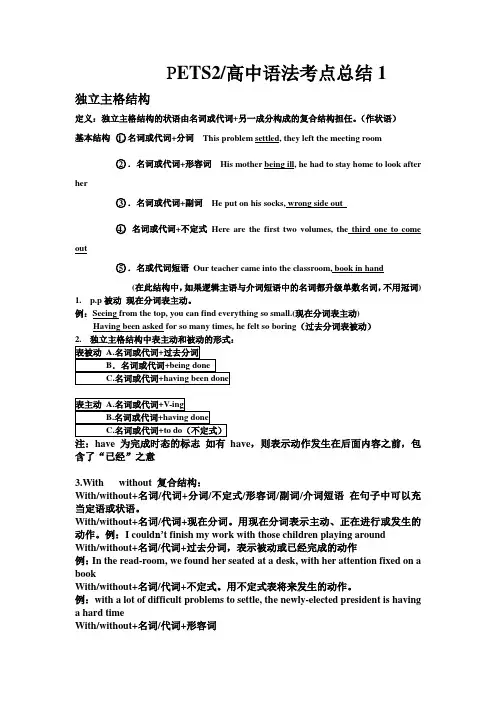
P ETS2/高中语法考点总结1独立主格结构定义:独立主格结构的状语由名词或代词+另一成分构成的复合结构担任。
(作状语)基本结构○1.名词或代词+分词This problem settled, they left the meeting room ○2.名词或代词+形容词His mother being ill, he had to stay home to look after her○3.名词或代词+副词He put on his socks, wrong side out○4.名词或代词+不定式Here are the first two volumes, the third one to come out○5.名或代词短语Our teacher came into the classroom, book in hand(在此结构中,如果逻辑主语与介词短语中的名词都升级单数名词,不用冠词) 1.p.p被动现在分词表主动。
例:Seeing from the top, you can find everything so small.(现在分词表主动) Having been asked for so many times, he felt so boring(过去分词表被动)have,则表示动作发生在后面内容之前,包含了“已经”之意3.With without 复合结构:With/without+名词/代词+分词/不定式/形容词/副词/介词短语在句子中可以充当定语或状语。
With/without+名词/代词+现在分词。
用现在分词表示主动、正在进行或发生的动作。
例:I could n’t finish my work with those children playing aroundWith/without+名词/代词+过去分词,表示被动或已经完成的动作例:In the read-room, we found her seated at a desk, with her attention fixed on a bookWith/without+名词/代词+不定式。

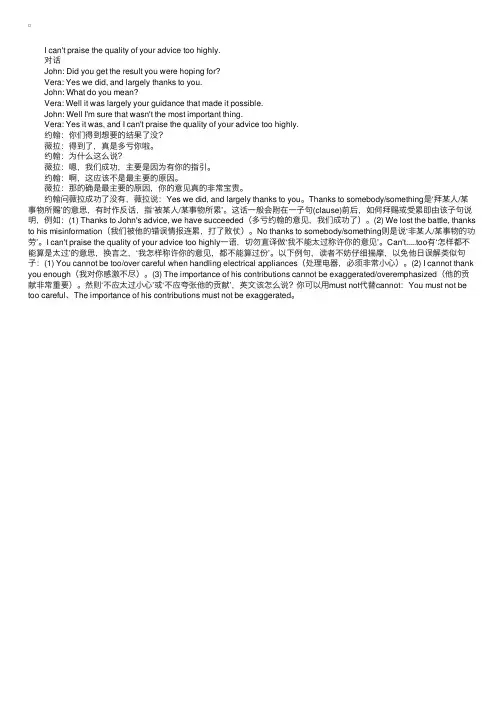
I can't praise the quality of your advice too highly. 对话 John: Did you get the result you were hoping for? Vera: Yes we did, and largely thanks to you. John: What do you mean? Vera: Well it was largely your guidance that made it possible. John: Well I'm sure that wasn't the most important thing. Vera: Yes it was, and I can't praise the quality of your advice too highly. 约翰:你们得到想要的结果了没? 薇拉:得到了,真是多亏你啦。
约翰:为什么这么说? 薇拉:嗯,我们成功,主要是因为有你的指引。
约翰:啊,这应该不是最主要的原因。
薇拉:那的确是最主要的原因,你的意见真的⾮常宝贵。
约翰问薇拉成功了没有,薇拉说:Yes we did, and largely thanks to you。
Thanks to somebody/something是‘拜某⼈/某事物所赐’的意思,有时作反话,指‘被某⼈/某事物所累’。
这话⼀般会附在⼀⼦句(clause)前后,如何拜赐或受累即由该⼦句说明,例如:(1) Thanks to John's advice, we have succeeded(多亏约翰的意见,我们成功了)。
(2) We lost the battle, thanks to his misinformation(我们被他的错误情报连累,打了败仗)。
No thanks to somebody/something则是说‘⾮某⼈/某事物的功劳’。
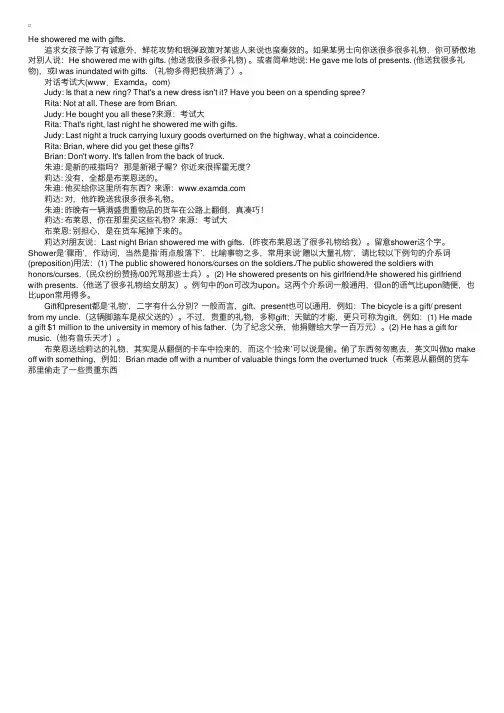
He showered me with gifts. 追求⼥孩⼦除了有诚意外,鲜花攻势和银弹政策对某些⼈来说也蛮奏效的。
如果某男⼠向你送很多很多礼物,你可骄傲地对别⼈说:He showered me with gifts. (他送我很多很多礼物) 。
或者简单地说: He gave me lots of presents. (他送我很多礼物),或I was inundated with gifts. (礼物多得把我挤满了)。
对话考试⼤(www.Examda。
com) Judy: Is that a new ring? That's a new dress isn't it? Have you been on a spending spree? Rita: Not at all. These are from Brian. Judy: He bought you all these?来源:考试⼤ Rita: That's right, last night he showered me with gifts. Judy: Last night a truck carrying luxury goods overturned on the highway, what a coincidence. Rita: Brian, where did you get these gifts? Brian: Don't worry. It's fallen from the back of truck. 朱迪: 是新的戒指吗?那是新裙⼦喔?你近来很挥霍⽆度? 莉达: 没有,全都是布莱恩送的。
朱迪: 他买给你这⾥所有东西?来源: 莉达: 对,他昨晚送我很多很多礼物。
朱迪: 昨晚有⼀辆满盛贵重物品的货车在公路上翻倒,真凑巧! 莉达: 布莱恩,你在那⾥买这些礼物?来源:考试⼤ 布莱恩: 别担⼼,是在货车尾掉下来的。
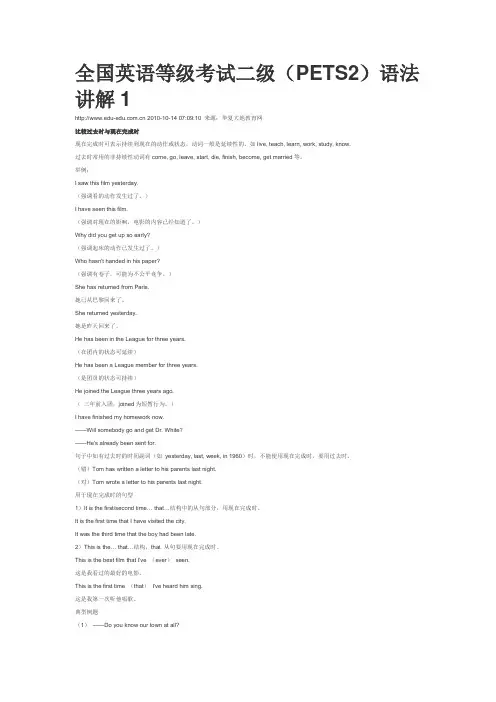
全国英语等级考试二级(PETS2)语法讲解1 2010-10-14 07:09:10 来源:华夏大地教育网比较过去时与现在完成时现在完成时可表示持续到现在的动作或状态,动词一般是延续性的,如live, teach, learn, work, study, know.过去时常用的非持续性动词有come, go, leave, start, die, finish, become, get married等。
举例:I saw this film yesterday.(强调看的动作发生过了。
)I have seen this film.(强调对现在的影响,电影的内容已经知道了。
)Why did you get up so early?(强调起床的动作已发生过了。
)Who hasn't handed in his paper?(强调有卷子,可能为不公平竞争。
)She has returned from Paris.她已从巴黎回来了。
She returned yesterday.她是昨天回来了。
He has been in the League for three years.(在团内的状态可延续)He has been a League member for three years.(是团员的状态可持续)He joined the League three years ago.(三年前入团,joined为短暂行为。
)I have finished my homework now.——Will somebody go and get Dr. White?——He's already been sent for.句子中如有过去时的时间副词(如yesterday, last, week, in 1960)时,不能使用现在完成时,要用过去时。
(错)Tom has written a letter to his parents last night.(对)Tom wrote a letter to his parents last night.用于现在完成时的句型1)It is the first/second time… that…结构中的从句部分,用现在完成时。
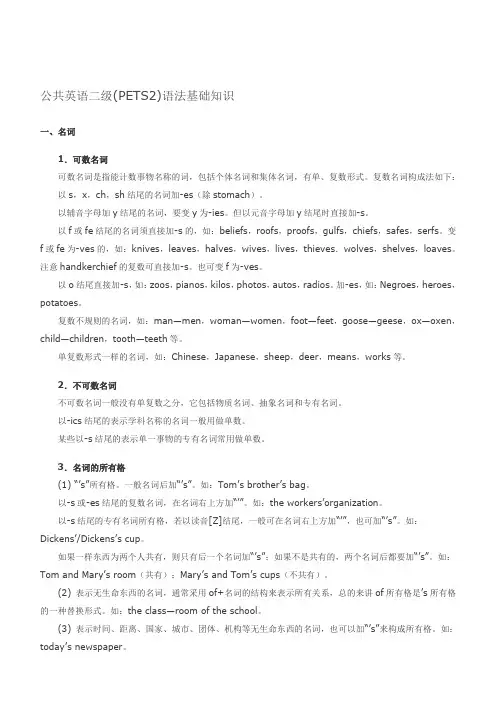
公共英语二级(PETS2)语法基础知识一、名词1.可数名词可数名词是指能计数事物名称的词,包括个体名词和集体名词,有单、复数形式。
复数名词构成法如下:以s,x,ch,sh结尾的名词加-es(除stomach)。
以辅音字母加y结尾的名词,要变y为-ies。
但以元音字母加y结尾时直接加-s。
以f或fe结尾的名词须直接加-s的,如:beliefs,roofs,proofs,gulfs,chiefs,safes,serfs。
变f或fe为-ves的,如:knives,leaves,halves,wives,lives,thieves.wolves,shelves,loaves。
注意handkerchief的复数可直接加-s。
也可变f为-ves。
以o结尾直接加-s,如:zoos,pianos,kilos,photos,autos,radios。
加-es,如:Negroes,heroes,potatoes。
复数不规则的名词,如:man—men,woman—women,foot—feet,goose—geese,ox—oxen,child—children,tooth—teeth等。
单复数形式一样的名词,如:Chinese,Japanese,sheep,deer,means,works等。
2.不可数名词不可数名词一般没有单复数之分,它包括物质名词、抽象名词和专有名词。
以-ics结尾的表示学科名称的名词一般用做单数。
某些以-s结尾的表示单一事物的专有名词常用做单数。
3.名词的所有格(1) “’s”所有格。
一般名词后加“’s”。
如:Tom’s brother’s bag。
以-s或-es结尾的复数名词,在名词右上方加“’”。
如:the workers’organization。
以-s结尾的专有名词所有格,若以读音[Z]结尾,一般可在名词右上方加“’”,也可加“’s”。
如:Dickens’/Dickens’s cup。
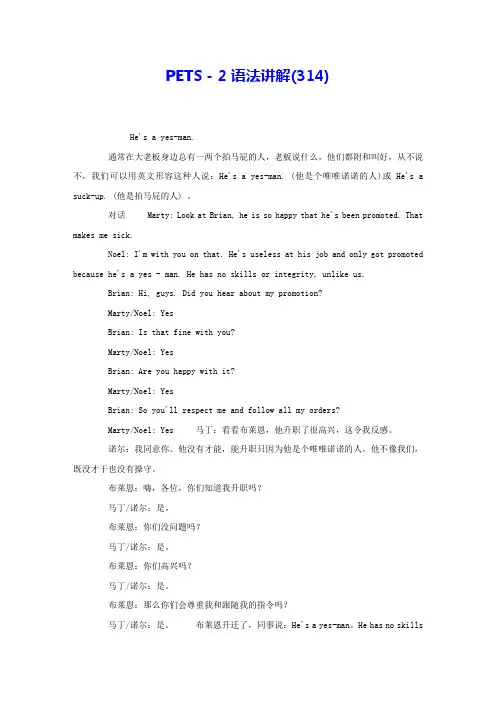
PETS-2语法讲解(314)He's a yes-man.通常在大老板身边总有一两个拍马屁的人,老板说什么,他们都附和叫好,从不说不,我们可以用英文形容这种人说:He's a yes-man. (他是个唯唯诺诺的人)或 He's a suck-up. (他是拍马屁的人) 。
对话Marty: Look at Brian, he is so happy that he's been promoted. That makes me sick.Noel: I'm with you on that. He's useless at his job and only got promoted because he's a yes - man. He has no skills or integrity, unlike us.Brian: Hi, guys. Did you hear about my promotion?Marty/Noel: YesBrian: Is that fine with you?Marty/Noel: YesBrian: Are you happy with it?Marty/Noel: YesBrian: So you'll respect me and follow all my orders?Marty/Noel: Yes 马丁:看看布莱恩,他升职了很高兴,这令我反感。
诺尔:我同意你。
他没有才能,能升职只因为他是个唯唯诺诺的人。
他不像我们,既没才干也没有操守。
布莱恩:嗨,各位,你们知道我升职吗?马丁/诺尔:是。
布莱恩:你们没问题吗?马丁/诺尔:是。
布莱恩:你们高兴吗?马丁/诺尔:是。
布莱恩:那么你们会尊重我和跟随我的指令吗?马丁/诺尔:是。
布莱恩升迁了,同事说:He's a yes-man。
He has no skillsor integrity(他对上司一味唯唯诺诺,既没有才能,也没有操守)。
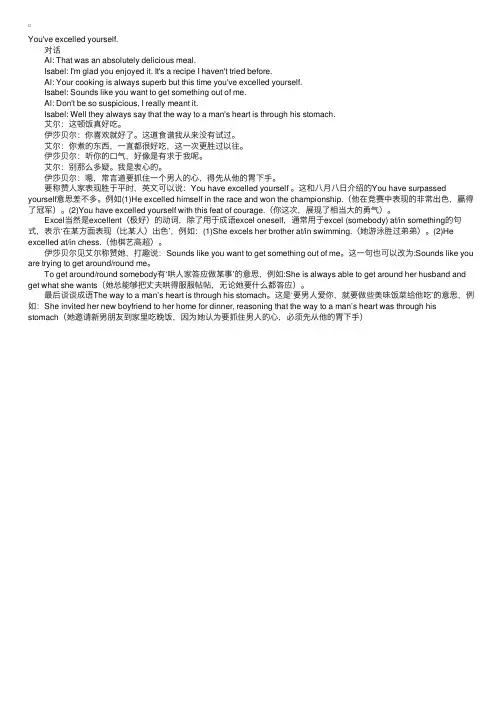
You've excelled yourself. 对话 Al: That was an absolutely delicious meal. Isabel: I'm glad you enjoyed it. It's a recipe I haven't tried before. Al: Your cooking is always superb but this time you've excelled yourself. Isabel: Sounds like you want to get something out of me. Al: Don't be so suspicious, I really meant it. Isabel: Well they always say that the way to a man's heart is through his stomach. 艾尔:这顿饭真好吃。
伊莎贝尔:你喜欢就好了。
这道⾷谱我从来没有试过。
艾尔:你煮的东西,⼀直都很好吃,这⼀次更胜过以往。
伊莎贝尔:听你的⼝⽓,好像是有求于我呢。
艾尔:别那么多疑。
我是衷⼼的。
伊莎贝尔:嗯,常⾔道要抓住⼀个男⼈的⼼,得先从他的胃下⼿。
要称赞⼈家表现胜于平时,英⽂可以说:You have excelled yourself 。
这和⼋⽉⼋⽇介绍的You have surpassed yourself意思差不多。
例如(1)He excelled himself in the race and won the championship.(他在竞赛中表现的⾮常出⾊,赢得了冠军)。
(2)You have excelled yourself with this feat of courage.(你这次,展现了相当⼤的勇⽓)。
Excel当然是excellent(极好)的动词,除了⽤于成语excel oneself,通常⽤于excel (somebody) at/in something的句式,表⽰‘在某⽅⾯表现(⽐某⼈)出⾊’,例如:(1)She excels her brother at/in swimming.(她游泳胜过弟弟)。
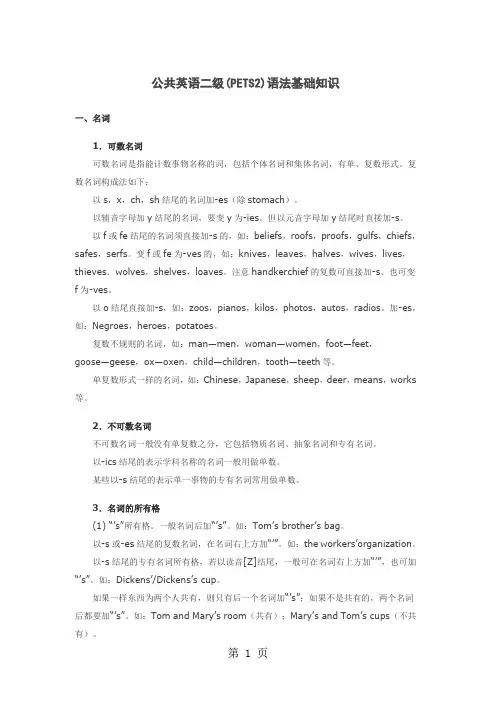
公共英语二级(PETS2)语法基础知识一、名词1.可数名词可数名词是指能计数事物名称的词,包括个体名词和集体名词,有单、复数形式。
复数名词构成法如下:以s,x,ch,sh结尾的名词加-es(除stomach)。
以辅音字母加y结尾的名词,要变y为-ies。
但以元音字母加y结尾时直接加-s。
以f或fe结尾的名词须直接加-s的,如:beliefs,roofs,proofs,gulfs,chiefs,safes,serfs。
变f或fe为-ves的,如:knives,leaves,halves,wives,lives,thieves.wolves,shelves,loaves。
注意handkerchief的复数可直接加-s。
也可变f为-ves。
以o结尾直接加-s,如:zoos,pianos,kilos,photos,autos,radios。
加-es,如:Negroes,heroes,potatoes。
复数不规则的名词,如:man—men,woman—women,foot—feet,goose—geese,ox—oxen,child—children,tooth—teeth等。
单复数形式一样的名词,如:Chinese,Japanese,sheep,deer,means,works 等。
2.不可数名词不可数名词一般没有单复数之分,它包括物质名词、抽象名词和专有名词。
以-ics结尾的表示学科名称的名词一般用做单数。
某些以-s结尾的表示单一事物的专有名词常用做单数。
3.名词的所有格(1) “’s”所有格。
一般名词后加“’s”。
如:Tom’s brother’s bag。
以-s或-es结尾的复数名词,在名词右上方加“’”。
如:the workers’organization。
以-s结尾的专有名词所有格,若以读音[Z]结尾,一般可在名词右上方加“’”,也可加“’s”。
如:Dickens’/Dickens’s cup。
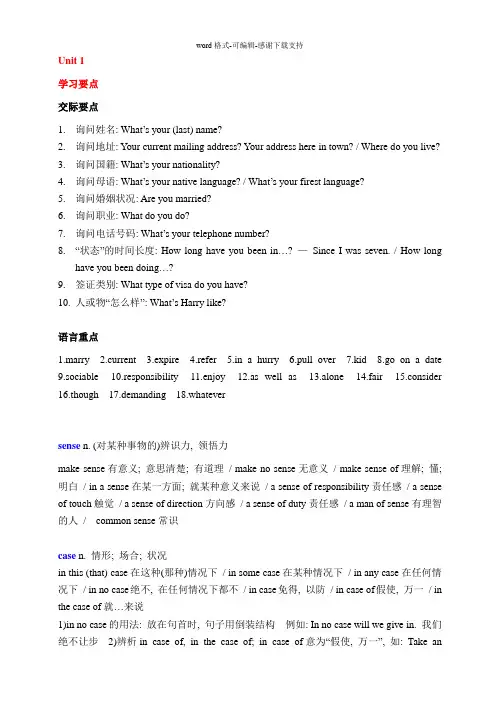
Unit 1学习要点交际要点1.询问姓名: What’s your (last) name?2.询问地址: Your current mailing address? Your address here in town? / Where do you live?3.询问国籍: What’s your nationality?4.询问母语: What’s your native language? / What’s your firest language?5.询问婚姻状况: Are you married?6.询问职业: What do you do?7.询问电话号码: What’s your telephone number?8.“状态”的时间长度: How long have you been in…? —Since I was seven. / How longhave you been doing…?9.签证类别: What type of visa do you have?10.人或物“怎么样”: What’s Harry like?语言重点1.marry2.current3.expire4.refer5.in a hurry6.pull over7.kid8.go on a date9.sociable 10.responsibility 11.enjoy 12.as well as 13.alone 14.fair 15.consider 16.though 17.demanding 18.whateversense n. (对某种事物的)辨识力, 领悟力make sense有意义; 意思清楚; 有道理/ make no sense无意义/ make sense of理解; 懂; 明白/ in a sense在某一方面; 就某种意义来说/ a sense of responsibility责任感/ a sense of touch触觉/ a sense of direction方向感/ a sense of duty责任感/ a man of sense有理智的人/ common sense常识case n. 情形; 场合; 状况in this (that) case在这种(那种)情况下/ in some case在某种情况下/ in any case在任何情况下/ in no case绝不, 在任何情况下都不/ in case免得, 以防/ in case of假使, 万一/ in the case of就…来说1)in no case的用法: 放在句首时, 句子用倒装结构例如: In no case will we give in. 我们绝不让步2)辨析in case of, in the case of; in case of意为“假使, 万一”, 如: Take anumbrella, just in case it rains. 随身带一把伞, 以防万一下雨/ in the case of 意为“至于”, 如: Failure is depressing, but in the case of my brother, it is drive to success. 失败令人沮丧, 但对我哥哥来说, 失败是成功的动力characteristic n. 特点, 特征be characteristic of…所独有的特征, 有…的特色辨析quality, characteristic和feature: 都含“特点”, “特性”, “特征”的意思qualit y系常用词, 指“表现于某人或某物与其他不同的特质或特点”, 如: We should keep the fine qualities of the working people. 我们应该保持劳动人民的优良品质characteristic指“特殊的, 易于辨认的特性或特征”, 如: A useful characteristic of the car is its ability to see in the dark. 这种汽车的一个有利特点是在黑暗中能看清东西feature指“引人注意的显著特征或细节”, 如: There’re several features in the plan which I like. 这个计划有许多我喜欢的特点refer sb. to…让某人参考或求助…如: The teacher referred him to Chapter V. 老师叫他看第五章refer to sb. (sth.) as把某人或某物称作如:Why do you refer to him as a “walking map”? 为什么你们称他“活地图”?pull over把车停在路边; 指示或迫使(车辆)停在路边如: The state trooper pulled the speeding motorist over. 州警命令超速的汽车司机把车停到路边a double date是口语化语言, 指两对男女同时参加的社交约会Unit 2学习要点交际要点1.询问过去信息: Did you stay at home last night?2.询问对方态度: Can you believe now? / Can you believe that we’ve been friends for 15years?3.询问看法: What do you think of Jake?4.询问意图: What do you mean stupid?5.询问喜好: Which do you prefer?6.询问两者差别: What differences are there between being 12 and being 16? / what’s thedifference between being 12 and 16?7.请求介绍: Could you tell me a little more about yourself?8.询问住址: Do you still live in London?9.询问生活方式: What do you do for a living?10.询问爱好: What do you do in your free time?语言重点1.mention2.quarrel with3.have a lot in common4.unfriendly5.joke6.pay back7.jealous8.shut up9.suppose 10.mean 11.prefer fortable 13.symbol 14.be made of 15.give light to 16.summary 17.loss 18.absolutelymention vt. n. 提到, 提起近义词: say, refer toquarrel vi. n. 吵架quarrel与about连用, 不与for连用如: She likes to quarrel with neighbors about the little things. 她喜欢与邻居为一些小事情争吵joke vi.开玩笑n.笑话, 玩笑make a joke 讲笑话, 开玩笑/ have a joke with someone 和某人说笑话/ play a joke on someone 开某人的玩笑/ no joke 不是闹着玩的suppose vt.be supposed to do sth. 应该…如: Tom, you’re not supposed to go out tonight. It’s raining heavily now. 汤姆, 今天晚上别出去, 外面正下着大雨suppose/supposing 可以引导条件从句, 相当于if的作用如: Suppose/Supposing he is absent, what sall we do? 如果他不在, 我们怎么办?shut v. 关上, 关闭shut off 切断(水, 电等) / shut out 把…排斥在外/ shut in 把…关在里面/ shut up 住口link v. 连接link to 与…相联系/ link up with 与…相连接如: I can’t link him to those people, I don’t knows them at all. 我无法把他和那些人联系在一起, 我想他根本不认识他们ps: connect表示“联系”时常与with连用confiden t adj. 有信心的be confident of/in 对…有信心如: Peter is confident of winning the post as the assistant to the managing director. 彼得确信他能获得总经理助理的职位summary n. 摘要, 概要, 总结in summary 总的说来, 概括起来如: So, in summary, we’ve got to try further funding.. 总之, 我们得设法进一步筹集资金loss n. 损失, 丢失at a loss 困惑, 不知所措如: Her words left us at a loss 她的话让我们不知所措wild有“野生的”意思, 也有“令人激动的”意思, 如: I was wild when meeting her ten years later. 十年后见到她时, 我非常激动boss通常是名词, 意为“老板”, 也作动词使用, 意为“指挥”, 如: David likes bossing people about. 大卫喜欢对人发号施令keep…from意为“阻止”, 如: But the stone walls keep the farmer’s cows from joining his neighbor’s cows. 但是石头墙使这家农民的牛不会混到邻居的牛群中去stand alone意为“无与伦比”brain power指“脑力, 智能”give light to意为“给…带来光明”, 如: This fund gives light to blind children in western areas. 这项基金给西部地区的盲童带来了光明。
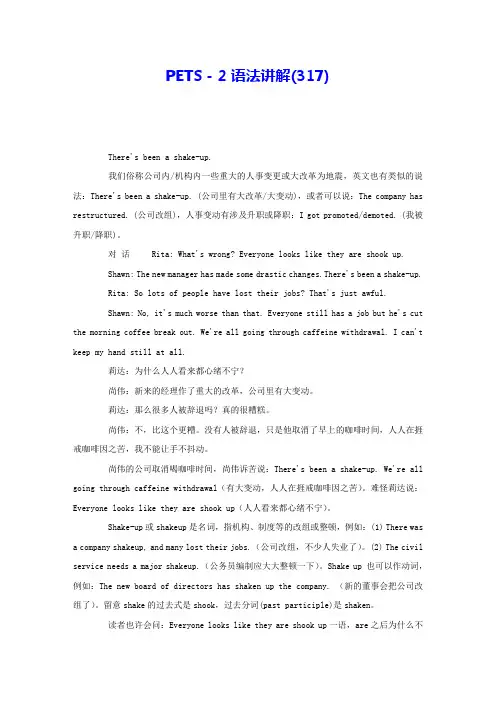
PETS-2语法讲解(317)There's been a shake-up.我们俗称公司内/机构内一些重大的人事变更或大改革为地震,英文也有类似的说法:There's been a shake-up. (公司里有大改革/大变动),或者可以说:The company has restructured. (公司改组),人事变动有涉及升职或降职:I got promoted/demoted. (我被升职/降职)。
对话Rita: What's wrong? Everyone looks like they are shook up.Shawn: The new manager has made some drastic changes.There's been a shake-up.Rita: So lots of people have lost their jobs? That's just awful.Shawn: No, it's much worse than that. Everyone still has a job but he's cut the morning coffee break out. We're all going through caffeine withdrawal. I can't keep my hand still at all.莉达:为什么人人看来都心绪不宁?尚伟:新来的经理作了重大的改革,公司里有大变动。
莉达:那么很多人被辞退吗?真的很糟糕。
尚伟:不,比这个更糟。
没有人被辞退,只是他取消了早上的咖啡时间,人人在捱戒咖啡因之苦,我不能让手不抖动。
尚伟的公司取消喝咖啡时间,尚伟诉苦说:There's been a shake-up. We're all going through caffeine withdrawal(有大变动,人人在捱戒咖啡因之苦)。
公共英语二级(PETS2)语法基础知识一、名词1.可数名词可数名词是指能计数事物名称的词,包括个体名词和集体名词,有单、复数形式。
复数名词构成法如下:以s,x,ch,sh结尾的名词加-es(除stomach)。
以辅音字母加y结尾的名词,要变y为-ies。
但以元音字母加y结尾时直接加-s。
以f或fe结尾的名词须直接加-s的,如:beliefs,roofs,proofs,gulfs,chiefs,safes,serfs。
变f或fe为-ves的,如:knives,leaves,halves,wives,lives,thieves.wolves,shelves,loaves。
注意handkerchief的复数可直接加-s。
也可变f为-ves。
以o结尾直接加-s,如:zoos,pianos,kilos,photos,autos,radios。
加-es,如:Negroes,heroes,potatoes。
复数不规则的名词,如:man—men,woman—women,foot—feet,goose—geese,ox—oxen,child—children,tooth—teeth等。
单复数形式一样的名词,如:Chinese,Japanese,sheep,deer,means,works等。
2.不可数名词不可数名词一般没有单复数之分,它包括物质名词、抽象名词和专有名词。
以-ics结尾的表示学科名称的名词一般用做单数。
某些以-s结尾的表示单一事物的专有名词常用做单数。
3.名词的所有格(1) “’s”所有格。
一般名词后加“’s”。
如:Tom’s brother’s bag。
以-s或-es结尾的复数名词,在名词右上方加“’”。
如:the wor kers’organization。
以-s结尾的专有名词所有格,若以读音[Z]结尾,一般可在名词右上方加“’”,也可加“’s”。
如:Dickens’/Dickens’s cup。
I'm bedridden. 其实要彻底对抗病魔,我们⾝体的抵抗⼒才是最重要的,所以医⽣常吩咐病⼈要多休息,让⾝体⾃然恢复,如果你⾝体虚弱需要卧床休息,英⽂可以说:I'm bedridden (我要卧病在床),也有别的说法,例如:I'm confined to my bed (我要限制在床上)/ I'm immobile (我⾏动不便)/ I'm too weak to get out of bed(我太虚弱不能起床) 。
对话 Rita: Come on, get up. It's time to rise and shine. Noel: I have to stay where I am. From now on I'm bed-ridden. I'm under doctor's orders. Rita: I'm sorry, I had no idea that you were so ill. Noel: I'm not ill at all, I feel fine. The doctor said that with my personality I had better keep out of the way of people as somebody was bound to do me harm. Pass me the remote would you? Any chance of some breakfast in bed? Rita: The doctor was right and after I've finished with you, you'll need to see him again and for a real injury this time. 莉达:起床吧,是起床的时候了! 诺尔:我要留在这⾥,从现在开始我要遵循医⽣吩咐卧床休息。
I wear the pants in this relationship. ⼤男⼈喜欢当家作主,喜欢另⼀半乖乖听话,也⼜些男⼈特别惧妻,什么事都留待太太作主。
如果你在这段关系中作主导,英⽂可以说:I wear the pants in this relationship.(我在这段关系中穿裤⼦),这句成语是指‘我是这段关系的掌权者’。
其它较⼝语化的说法还有:I'm the boss.(我是⽼板)、I'm in charge.(我是主事者)。
对话考试⼤论坛 Husband: Let's go to that party tonight. Wife: No thanks, I'd rather stay at home and watch TV. Husband : We're going and that's final. I wear the pants in this relationship. Wife: Well, you won't be at the party tonight. All your pants are in the washing machine. Unless you want to wear one of my dresses, we're staying home. 丈夫: 今晚⼀起去那个派对。
来源: 妻⼦: 不去了,我宁愿留在家⾥看电视。
丈夫: 我们要去,这是最后决定,我是⼀家之主。
妻⼦: 嗯,你今晚去不成派对了,你所有的裤⼦都还在洗⾐机⾥,除⾮你想穿我的裙⼦,我们就留在家⾥吧。
从前中国妇⼥‘未嫁从⽗,既嫁从夫,夫死从⼦’,男⼈总是⼀家之主。
传统西⽅家庭也是由穿裤⼦的男⼈掌权,所以英⽂成语to wear the pants/trousers(穿裤⼦)即‘当家作主’,常⽤来说牝鸡司晨,例如:(1) It is said of the couple that the wife wears the pants.(据说,他们夫妻之间,丈夫听命于妻⼦)。
延续动词与瞬间动词
1)用于完成时的区别
延续动词表示经验、经历; 瞬间动词表示行为的结果,不能与表示段的时间状语连用。
He has completed the work. 他已完成了那项工作。
(表结果)
I've known him since then. 我从那时起就认识他了。
(表经历)
2)用于till/until从句的差异
延续动词用于肯定句,表示"做……直到……" 瞬间动词用于否定句,表示"到……,才……"
He didn't come back until ten o'clock.
他到10 点才回来。
He slept until ten o'clock.
他一直睡到10点。
典型例题
1. You don't need to describe her. I ___ her several times.
A. had met
B. have met
C. met
D. meet
答案B. 首先本题后句强调对现在的影响,我知道她的模样,你不用描述。
再次,several times告知为反复发生的动作,因此用现在完成时。
2.——I'm sorry to keep you waiting.
——Oh, not at all. I ___ here only a few minutes.
A. have been
B. had been
C. was
D. will be
答案A. 等待的动作由过去开始,持续到现在,应用现在完成时。
He kept changing channels on the remote. 对话 Sharon: My mother got really annoyed with my father yesterday evening. Heather: Why, did he complain about her cooking? Sharon: Oh no, she's a great cook. It was when they were watching television. Heather : Don't tell me he fell asleep in front of the television and started snoring. Sharon: No, he does that sometimes but this was because he kept changing channels on the remote. Heather: All men do that, it's one of their most annoying habits. 莎伦:昨天晚上,爸爸真令妈妈⼗分⽣⽓。
希瑟:哦,是因为你爸爸说她做的饭菜不好吃吗? 莎伦:啊,不是,妈妈做的饭菜很好吃。
那是他们看电视时的事。
希瑟:你爸爸不是在电视机前睡着了,打起鼾来吧。
莎伦:不是。
爸爸有时会这样,但这次是因为他⽤遥控器不断的转台。
希瑟:男⼈都是这样的。
那是他们⾮常惹⼈厌的习惯。
‘遥远’英⽂是remote,He lives in a remote village即‘他住在⼀个偏远村庄’。
遥控器是remote control,常简称为remote,例如:Have you seen the remote (control) for the TV/garage door?(有没有见过电视/车房门遥控器?)⽤遥控器转电视台,英⽂叫zap,例如:Would you stop zapping the channels!(别不断转电视台好吗?)因此,电视或录像遥控器也叫zapper,例如:Hand me the zapper please(请把电视遥控器给我)。
It's hard to make a living. 打⼯族常抱怨谋⽣艰难,赚到的钱只够养活⾃⼰,英⽂可以说:It's hard to make a living. (很难赚到维持⽣计的钱),或者说:It's hard to earn a living,⽽收⼊平衡⽀出,英⽂可以说:to make ends meet,如果只能糊⼝,英⽂可以说:living hand-to-mouth。
对话来源: Kate: Are you enjoying living in Asia? Lisa: Yes, but I'll tell you one thing, it's hard to make a living. Kate: You must be kidding. This area is booming and there are jobs aplenty. You have a university degree don't you? Then what's the problem? Lisa: My degree is in ancient Egyptian archeology with a minor in South American tribal languages. My phone doesn't ring a lot with job offers. 凯伊:你喜欢在亚洲居住吗?来源: 莉萨:是,但我想告诉你,谋⽣很不容易。
凯伊:你⼀定在开玩笑,这地⽅正蓬勃发展,有⼤量职位空缺,你不是有⼤学学位吗?那会有什么问题? 莉萨:我拿的是古埃及考古学学位,副修南美洲部族语⾔,我没收到叫我去应征的电话。
凯伊说亚洲经济蓬勃: There are jobs aplenty.(有⼤量职位空缺) 。
但莉萨所习学科不切实际,所以说谋⽣很不容易:It's hard to make a living。
公共英语二级(PETS2)语法基础知识一、名词1.可数名词可数名词是指能计数事物名称的词,包括个体名词和集体名词,有单、复数形式。
复数名词构成法如下:以s,x,ch,sh结尾的名词加-es(除stomach)。
以辅音字母加y结尾的名词,要变y为-ies。
但以元音字母加y结尾时直接加-s。
以f或fe结尾的名词须直接加-s的,如:beliefs,roofs,proofs,gulfs,chiefs,safes,serfs。
变f或fe为-ves的,如:knives,leaves,halves,wives,lives,thieves.wolves,shelves,loaves。
注意handkerchief的复数可直接加-s。
也可变f为-ves。
以o结尾直接加-s,如:zoos,pianos,kilos,photos,autos,radios。
加-es,如:Negroes,heroes,potatoes。
复数不规则的名词,如:man—men,woman—women,foot—feet,goose—geese,ox—oxen,child—children,tooth—teeth等。
单复数形式一样的名词,如:Chinese,Japanese,sheep,deer,means,works等。
2.不可数名词不可数名词一般没有单复数之分,它包括物质名词、抽象名词和专有名词。
以-ics结尾的表示学科名称的名词一般用做单数。
某些以-s结尾的表示单一事物的专有名词常用做单数。
3.名词的所有格(1) “’s”所有格。
一般名词后加“’s”。
如:Tom’s brother’s bag。
以-s或-es结尾的复数名词,在名词右上方加“’”。
如:the workers’organization。
以-s结尾的专有名词所有格,若以读音[Z]结尾,一般可在名词右上方加“’”,也可加“’s”。
如:Dickens’/Dickens’s cup。
如果一样东西为两个人共有,则只有后一个名词加“’s”;如果不是共有的,两个名词后都要加“’s”。
如:Tom and Mary’s room(共有);Mary’s and Tom’s cups(不共有)。
(2) 表示无生命东西的名词,通常采用of+名词的结构来表示所有关系,总的来讲of所有格是’s所有格的一种替换形式。
如:the class—room of the school。
(3) 表示时间、距离、国家、城市、团体、机构等无生命东西的名词,也可以加“’s”来构成所有格。
如:today’s ne wspaper。
二、冠词1.不定冠词a,an表示one或every。
如:You have a mouth。
表示某一类人、事或物,相当于any。
如:A spade is a tool。
用于某些固定词组中。
如:a bit,a lot of。
泛指某人或某物。
如:A boy is waiting for her。
用在rather,many,what等词之后。
如:You are rather a fool。
注意:名词以元音音素开头时,前面若加不定冠词,要用“an”。
2.定冠词the表示上文已提到过或下文将要提到的人或事物。
如:I am very interested in the book。
表示独一无二的人或事物。
如:the world,the sun,the moon,the earth。
用在序数词、形容词最高级及对两人或物进行比较时起特定作用的比较级前。
如:the young,the second story,the largest room。
用在以-ese,-ch,-sh等结尾和表示国家、党派等专有名词前,以及在江、河、湖、海、山川、群岛的名词前。
如:the Communist Party of China,the Changjiang River,the Great Lake。
用在方位名词前以及某些表示时间的词组或习惯语中。
如:in the west,on the right。
用在形容词前表示一类人。
如:the young,the dead。
在姓氏复数形式前,表示全家人,或这一姓氏的夫妇俩。
如:The Turners are sitting at the breakfast table。
用在单数可数名词前,表示某一类人或事物。
如:The horse is a use-ful animal。
在艺术、文娱活动名称前通常用定冠词。
如:go to the cinema。
3.不加冠词(1) 一般专有名词、物质名词、抽象名词、人名、地名等名词前不加冠词。
如:America,China,Shanghai Railway Station。
但是当一个抽象名词或物质名词被限定时,前面加the。
如:The milk in the bottle has gone bad抽象名词或物质名词前或后加上表示其特殊性质或类别的修饰词,指概念的“一种”、“一类”、“一次”等时,用不定冠词。
如:After a swim,he had a rest。
(2) 可数名词前有物主代词、指示代词、不定代词、名词所有格等限制时,不加冠词。
如:This book is mine。
(3) 季节、月份、日期、一日三餐前一般不加冠词。
如:Summer is the warmest season of the year。
如果月份等被一个限定性定语修饰,就要加冠词。
如:Jack joined the Army in the spring of 2002。
(4) 表示语言学科名称、球类运动的名词前一般不用冠词。
如:He is studying French in Paris。
但是在the Chinese language,the English lan-guage等中要用定冠词。
(5) 在以“普通名词或形容词最高级+as”开始的让步状语从句中,前面不加冠词。
如:Shortest as he is。
三、数词1.基数词(1) 21~99之间的二位数由十位数加个位数再加连字符构成。
如24可写成twenty-four。
(2) 101~999之间的三位数由hundred加and再加二位数或末位数构成。
加489可写成four hundred and eighty-nine。
(3) 表示确切数目时,基数词hundred,thousand,million,billion不加s。
如several hundred,ten million。
但是表示不确定数目时,要用复数形式。
如hundreds of。
(4) 表示“在几十年代”用“in+the+逢十的数词复数”。
如in the1980s或80’s。
2.序数词一般由基数词加-th构成,前面一般加定冠词the。
如the two hundredth。
以y结尾的基数词构成序数词时,把y改成i,再加-eth。
如the fiftieth。
不规则的序数词有first,second,third,fifth,eighth,ninth,twelfth。
3.其他几种数词(1) 分数由基数词和序数词合成,分子用基数词,分母用序数词。
分子大于l时,分母的序数词要用复数形式。
如11/3读做three and two thirds1/3读做one(a)third;但1/2读做one(a)half,1/4读做one(a)quarter。
(2) 小数点读做point;“零”读做zero;带小数点的数字从左至右依次读出。
如0.2读做zero point two。
(3) 百分数读做percent。
如17%读做seventeen percent。
四、代词1.人称代词人称代词的主格做主语;宾格做宾语或表语。
2.物主代词物主代词有两大类,一般形容词性物主代词做定语;名词性物主代词做主语、宾语和表语。
3.反身代词反身代词由形容词性物主代词加-self或-selves构成如:myself,yourself,himself,herself,itself,ourselves,yourselves,themselves反身代词在句子中可充当宾语、表语和同位语。
4.疑问代词常用的疑问代词有who,whom,whose,whoever,which,what等。
疑问代词用来构成特殊疑问句,可用做主语、宾语、表语和定语。
5.指示代词指示代词表示单数的有this,that;表示复数的有these,those。
用法如下:(1) 在句中做主语、宾语和定语。
(2) this(these)一般用来指时间和空间上较近的人或物;that(those)指时间和空间上较远的人或物。
6.不定代词不定代词具有名词和形容词的性质,并有可数与不可数的区别。
不定代词的种类较多,用法和侧重点略有不同,介绍如下。
(1) one,some与any的区别:one作为不定代词可以泛指任何人,还可以替代名词词组或名词词组中的中心词,其复数形式为ones;some表示肯定意义,一般用于肯定旬;any表示否定或疑问意义,多用于疑问、否定句中。
(2) each与every的区别:each通常用来指小到两个,强调个别,可以充当定语、主语、宾语和同位语;every则通常指三个以上的人,强调整体,相当于汉语的“每个都”,在句中只做定语。
(3) none与no的区别:no(not any)在句子中做定语;none在句中做主语或宾语,代替不可数名词做主语时,谓语动词用单数形式;代替可数名词做主语时,谓语动词可用单数,也可用复数。
(4) other与another的区别:other可用于单数和复数,泛指“另外的”,做定语,常与复数名词或单数不可数名词连用;others是other的复数形式,泛指“别的人或物”,但不是全部;the other指“两者中的另一个”,常与one连用,做定语修饰复数名词时,表示另一方中的“全部其余的”;the others是the other 的复数形式,特指“全部其余的人或物”;another指不确定的另一个,三个或三个以上中的“任何一个”、“再一…”、“另一个”,做代词或形容词。
(5) both与all的区别:both指两个人或物;all指三个以上的人或物。
两者在句中都可做主语、宾语、表语、同位语和定语。
(6) either与neither的区别:either表示“两个中的任何一个”;neither表示“两个中的任何一个都不”。
两个词都表示单数。
五、形容词和副词的比较等级比较等级分为原级、比较级和最高级。
1.原级用法①表示被比较双方在某一方面相等或相同时, 用as + adj / adv + as结构, 表示“…和…一样” 。
如:a. Xiao Li is as tall as his sister.b. It is as cold today as it was yesterday.c. There are as many seats in this hall as in that hall.②表示被比较双方在某一方面不相等或不同时, 用not as / so + adj / adv + as, 表示“…和…不一样”a. Xiao Li is not as / so tall as his brother.b. It is not so / as cold today as yesterday.c. There are not so / as many seats in this hall as in that hall.2.比较级的用法①对方比较,表示一方超过另一方时,用“比较级+ than”的结构表示。